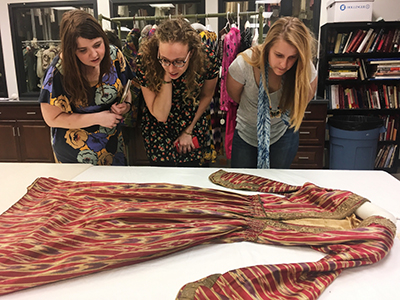
Learning Opportunities

Seeing the Texas Fashion Collection's facilities can highlight the behind-the-scenes
work relating to the artifacts' care, preservation and documentation.
As an extension of the University of North Texas's designation as a top-tier research university, the Texas Fashion Collection frames its world-class holdings as research resources. The TFC strives to make its collection available through object-based educational programming, ranging from research appointments to facilities tours to customized lectures. While the primary audiences for these learning opportunities are UNT students, faculty, and staff, the TFC welcomes learners from all backgrounds to engage with its holdings.
Please note that the TFC does not have permanent exhibition space or regular gallery hours, so all programming requires advance planning. Because of staffing limitations and the TFC's educational focus, priority is given to individuals and groups with professional or research interests relating to the TFC's holdings. Per the University of North Texas System, offices are closed during federal, state, and university holidays, which can be found online on the UNT System calendar.
Research Appointments
Groups or individuals are welcome to engage in research appointments focusing on Texas Fashion Collection artifacts. To ensure the safety of the artifacts, these appointments must take place either virtually or in person at the TFC's permanent collection facility at Welch Street Complex 1 (maximum capacity of 15) or in the Westheimer Student Research Gallery in the Art Building (maximum capacity of 25), both on UNT's campus.

Researchers examining a TFC exhibit.
To request an appointment, email the TFC staff at cvad.tfc@unt.edu and share your research question and availability. Appointments are granted based on staff and facility availability and must be scheduled in advance.
To protect the objects in the collection, please plan for research appointments in the following ways.
- Bring a pencil, notepad, camera, and/or smartphone to take notes during your visit. Pens, markers, and flash photography are not allowed.
- While the TFC study space has limited shelving for backpacks and bags, food and beverages are not allowed to ensure the safety of our objects and the cleanliness of our space.
- For research appointments, dress in a manner that will not damage the objects. Consider how your clothing, cosmetics, or accessories might snag or transfer onto artifacts.
Though only a limited number of objects can be consulted during an appointment, a portion of the collection is available online through the UNT Digital Library.
Tours
As a professional development opportunity for early-career scholars or colleagues working in archives, museums, or cultural institutions, seeing the Texas Fashion Collection's facilities can highlight the behind-the-scenes work relating to the artifacts' care, preservation and documentation. Because these facilities include sensitive areas designed for the active work of our staff and the safety of our artifacts, the TFC cannot offer tours to all interested parties. However, we are happy to entertain requests from those whose learning would benefit from a behind-the-scenes perspective.
To request a tour, email the TFC staff at cvad.TFC@unt.edu and share your professional goals and availability. Appointments are granted based on staff and facility availability and must be scheduled in advance.
Lectures
To promote the accessibility of the object-based research conducted by TFC staff, lectures are offered on a variety of topics relating to the collection's artifacts and history. This programming can be highly tailored to the audience and their interests, take place in person or virtually, and offer opportunities for larger groups to engage with the TFC. For groups associated with schools or educational institutions, lectures can be arranged for minimal to no cost; for other groups or organizations, a lecture can be arranged for a modest honorarium that supports the TFC's operations.
To request a lecture, email the TFC staff at cvad.TFC@unt.edu and share a description of your group, the group's size, the goals for the program, and your availability. Appointments are granted based on staff and facility availability and must be scheduled in advance.
Wandering Wardrobe
In partnership with the Onstead Institute for Education in the Visual Arts & Design, the Texas Fashion Collection offers the Wandering Wardrobe, a project that brings fashion design and history resources to K-12 art classrooms. Through the Wandering Wardrobe, educators have access to artifacts, research resources, and making activities to enhance their classroom learning. Read more on the Onstead Institute's website for information about hosting a garment, accessing research resources, and viewing videos of object-based teaching with Wandering Wardrobe artifacts.